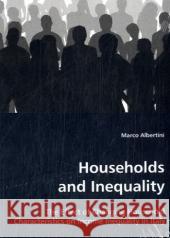Households and Inequality: The Effect of Changing Household Characteristics on Income Inequality in Italy » książka
Households and Inequality: The Effect of Changing Household Characteristics on Income Inequality in Italy
ISBN-13: 9783639023787 / Angielski / Miękka / 2008 / 172 str.
Households and Inequality: The Effect of Changing Household Characteristics on Income Inequality in Italy
ISBN-13: 9783639023787 / Angielski / Miękka / 2008 / 172 str.
(netto: 289,00 VAT: 5%)
Najniższa cena z 30 dni: 303,45
ok. 10-14 dni roboczych.
Darmowa dostawa!
Over the last decades western societies have witnessed significant changes in inequality levels. Among the various factors which have been explored to explain differences and trends in income inequality, there is one which has received relatively little attention: differences and changes in household characteristics. This book aims to fill this gap: it explores the changing relationship between the economic and demographic characteristics of Italian families and income inequality. The analyses show that the equalising power of Italian families has decreased in recent decades. But, it is also found that the relevance of income differences between household forms, in determining the level of income inequality, is increasing. In addition, it results that the recent impoverishment of young families with children has contributed to boost income inequalities, whereas the increasing participation of women in to paid labour market has had an equalising effect. These findings should help scholars, interested in inequality and family, in having a better understanding of the redistributive consequences of the most recent demographic and economic changes in Southern European societies."
Over the last decades western societies have witnessed significant changes in inequality levels. Among the various factors which have been explored to explain differences and trends in income inequality, there is one which has received relatively little attention: differences and changes in household characteristics.This book aims to fill this gap: it explores the changing relationship between the economic and demographic characteristics of Italian families and income inequality. The analyses show that the equalising power of Italian families has decreased in recent decades. But, it is also found that the relevance of income differences between household forms, in determining the level of income inequality, is increasing. In addition, it results that the recent impoverishment of young families with children has contributed to boost income inequalities, whereas the increasing participation of women in to paid labour market has had an equalising effect.These findings should help scholars, interested in inequality and family, in having a better understanding of the redistributive consequences of the most recent demographic and economic changes in Southern European societies.











